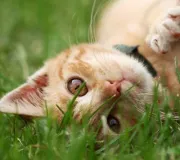Unfortunately, your pet isn’t always at her safest inside the four walls of your home. There are many indoor pet toxins to be aware of. Learn more from your St. Lucie County veterinarian below.
Human Foods
Chocolate, onions, garlic, grapes, raisins, candy sweetened with xylitol—the list of toxic human foods goes on and on. Ask your veterinarian for a complete list of dangerous human foods and keep them safely stored where your pet can’t get to them. Make sure food isn’t left sitting out on tables or counters where your pet can steal a bite.
Cleaning Supplies
Household cleaning solutions, paint, solvents, lubricants, sprays, bleach, detergents, and more all probably contain ingredients that aren’t good for your pet. Follow the directions on each package for proper use, and store all chemicals in a locked cabinet that your pet can’t access.
Antifreeze
Antifreeze contains ethylene glycol, which tastes sweet and may attract pets. It’s also extremely toxic. Store antifreeze in sealed containers that pets can’t reach, and clean up any spills immediately. You can also consider using products that contain propylene glycol as a safer alternative.
Human Medicine
Pets can oftentimes chew through the plastic bottles that human medications are stored in. Pain relievers, anti-depressants, and many other over-the-counter or prescription drugs can be toxic to pets. Keep them in closed cabinets far away from animals.
Pest Control
The insecticides and pesticides we use in our homes work well to kill pests, but be aware that they’re poisonous to our pets as well. Be extremely careful with rat poison, mouse poison, or any other household pest control product. Ask your St. Lucie County veterinarian about alternative options.
Household Plants
All species of lilies are poisonous to cats. Various other household plants, like poinsettias, azaleas, and many more, can also be toxic if enough is swallowed. Keep plants out of reach of your pets or leave them out of your home entirely. For more information on plants harmful to pets, see the article ‘Popular Plants That Are Toxic To Cats‘.
For an assessment of your pet’s health and guidance on avoiding toxins, consider our ‘Veterinary Diagnostics’ services. Contact us, your local animal clinic in Treasure Coast, FL!

